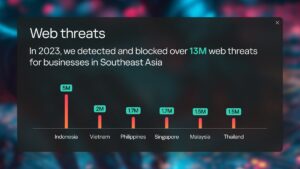Heaptalk, Jakarta — Kaspersky has detected and blocked more than 13 million web threats from its security solutions for Southeast Asia from January to December 2023. The report also revealed that cybercriminals launched around 36,552 online attacks daily on businesses in the region last year. Historical data from this global cybersecurity company also shows a spike of 31% last year compared to the former in 2020.
Web-based or online threats are included in the cyber risk category that can cause unwanted events and actions via the internet. Vulnerabilities of end users, web service developers, or the web service itself enable web threats. Regardless of the purpose and cause, the consequences of web threats can be detrimental to individuals and organizations.
Last year, Kaspersky noted that threat actors targeting businesses in Indonesia reached 5 million threats, lower than the previous year’s 6.4 million threats. In addition, this cybersecurity company reported a significant increase in the Philippines, with the number of threat actors targeting businesses in this country attaining (243%), or around 1.7 million threats, compared to the 2022 total of 492,567 threats. Besides, Vietnamese businesses faced 2 million web-based threats last year, compared to 2.4 million threats in 2022.
Meanwhile, Singapore’s company also encountered an 86% increase in threats last year, around 1.7 million, compared to 889,093 in 2022. However, the data demonstrated that Thailand’s companies experienced a rise in threats of only 24%, around 1.5 million in 2023, compared to 2022, which only reached 1.2 million threats. Further, Malaysia’s businesses will experience web-based threats, reaching 1.5 million threats in 2023, compared to the previous year, which was higher at 1.8 million cases.

“Economists forecasted positive economic growth for Southeast Asian countries this year. This forecast aligns with the strong growth of the digital economy in the market, which opens up opportunities for individuals and companies. As most regional governments develop and improve policies to encourage digital economies and infrastructure, local businesses must prioritize cyber defense against threats lurking in cyberspace that risk hampering their efforts to harness digitalization.” General Manager of Kaspersky of Yeo Siang Tiong said.
A new study also reveals that Southeast Asian companies know the correlation between digitalization and increased cyber threats. More than a quarter (28%) of businesses surveyed they were confirmed that their organizations are more vulnerable to cyberattacks due to significant digitalization developments. External pressure to disclose ongoing cyber incidents and comply with cybersecurity practices is also higher for 16% of surveyed respondents.
“We look forward to this year, which should be the proper momentum for businesses to take another step forward in their cybersecurity. With the vast amount of data that all types of organizations handle today and the enormous reputational and financial damage affecting cyber incidents, an adaptive, intelligence-based portfolio of security solutions and services is the most needed tool today,” added Yeo.











